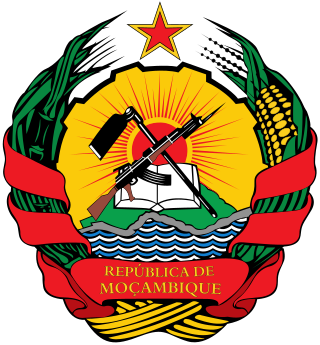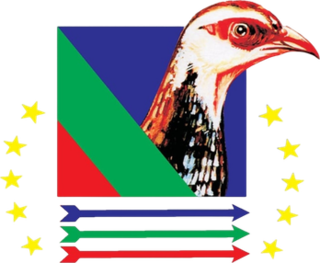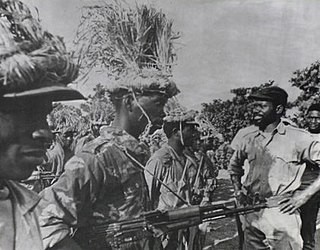Related Research Articles

Mozambique, officially the Republic of Mozambique, is a country located in southeastern Africa bordered by the Indian Ocean to the east, Tanzania to the north, Malawi and Zambia to the northwest, Zimbabwe to the west, and Eswatini and South Africa to the southwest. The sovereign state is separated from the Comoros, Mayotte and Madagascar by the Mozambique Channel to the east. The capital and largest city is Maputo.
Mozambique was a Portuguese colony, overseas province and later a member state of Portugal. It gained independence from Portugal in 1975.

Politics in Mozambique takes place in a framework of a semi-presidential representative democratic republic, whereby the President of Mozambique is head of state and head of government in a multi-party system. Executive power is exercised by the government. Legislative power is vested in both the government and the Assembly of the Republic.

While alliances dating back to the Mozambican War of Independence remain relevant, Mozambique's foreign policy has become increasingly pragmatic. The twin pillars of the policy are maintenance of good relations with its neighbors and maintenance and expansion of ties to development partners.

Portuguese Mozambique or Portuguese East Africa were the common terms by which Mozambique was designated during the period in which it was a Portuguese colony. Portuguese Mozambique originally constituted a string of Portuguese possessions along the south-east African coast, and later became a unified colony, which now forms the Republic of Mozambique.

The economy of Mozambique is $14.396 billion by gross domestic product as of 2018, and has developed since the end of the Mozambican Civil War (1977–1992). In 1987, the government embarked on a series of macroeconomic reforms, which were designed to stabilize the economy. These steps, combined with donor assistance and with political stability since the multi-party elections in 1994, have led to dramatic improvements in the country's growth rate. Inflation was brought to single digits during the late 1990s, although it returned to double digits in 2000–02. Fiscal reforms, including the introduction of a value-added tax and reform of the customs service, have improved the government's revenue collection abilities.

FRELIMO is a democratic socialist political party in Mozambique. It is the dominant party in Mozambique and has won a majority of the seats in the Assembly of the Republic in every election since the country's first multi-party election in 1994.

RENAMO is a Mozambican political party and militant group. The party was founded with the active sponsorship of the Rhodesian Central Intelligence Organisation (CIO) in May 1977 from anti-communist dissidents opposed to Mozambique's ruling FRELIMO party. RENAMO was initially led by André Matsangaissa, a former senior official in FRELIMO's armed wing, and was composed of several anti-communist dissident groups which appeared immediately prior to, and shortly following, Mozambican independence. Matsangaissa, who died in 1979, was succeeded by Afonso Dhlakama, who led the organization until his death in 2018. He was succeeded by Ossufo Momade.

The Mozambique national football team represents Mozambique in men's international football competitions and is controlled by the Mozambican Football Federation, the governing body for football in Mozambique. Mozambique have never qualified for a FIFA World Cup, but they have qualified for four Africa Cup of Nations in 1986, 1996, 1998 and most recently the 2010 Africa Cup of Nations in Angola, being eliminated in the first round in all four.
The metical is the currency of Mozambique, abbreviated with the symbol MZN or MT. It is nominally divided into 100 centavos. The name metical comes from Arabic مثقال (mithqāl), a unit of weight and an alternative name for the gold dinar coin that was used throughout much of Africa until the 19th century.
Marrabenta is a popular style of Mozambican dance music combining traditional Mozambican dance rhythms with Portuguese folk music. It was developed in Maputo, the capital city of Mozambique, during the 1930s and 1940s.

The Mozambican Civil War was a civil war fought in Mozambique from 1977 to 1992. Like many regional African conflicts during the late twentieth century, the Mozambican Civil War possessed local dynamics but was also exacerbated greatly by the polarizing effects of Cold War politics. The war was fought between Mozambique's ruling Marxist Mozambique Liberation Front (FRELIMO), the anti-communist insurgent forces of the Mozambican National Resistance (RENAMO), and a number of smaller factions such as the PRM, UNAMO, COREMO, UNIPOMO, and FUMO.

Mozambique is a Christian majority country, with Islam being a minority faith practiced by around 17.5% of the population as of 2020. The faith was introduced by merchants visiting the Swahili coast, as the region was part of the trade network that spanned the Indian Ocean. This later led to the formation of several officially Muslim political entities in the region.

The Mozambican War of Independence was an armed conflict between the guerrilla forces of the Mozambique Liberation Front or FRELIMO and Portugal. The war officially started on September 25, 1964, and ended with a ceasefire on September 8, 1974, resulting in a negotiated independence in 1975.
The seventh All-Africa Games were held in September 1999 in Johannesburg, South Africa. As the track is at an altitude of 1748 metres all performances are considered to be set at altitude, this is believed to assist events up to 400 metres and in the long jump and triple jump. However, for events beyond 800 metres the thinner air is believed to have a detrimental effect on performances.

The Mozambican Cricket Association is the official governing body of the sport of cricket in Mozambique. Its current headquarters is in Maputo, Mozambique. The Association is Mozambique's representative at the International Cricket Council and is an associate member and has been a member of that body since 2003. It is also a member of the African Cricket Association.

Diplomatic relations were established between Eswatini and Russia on 19 November 1999.
The Evangelical Lutheran Church in Mozambique is an Evangelical Lutheran church in Mozambique. It has a membership of 12,606, and has been a member of the Lutheran World Federation since 1999. It is also affiliated with its regional expression, the Lutheran Communion in Southern Africa, and with the Christian Council of Mozambique. The church's head is Bishop Eduardo Sinalo

Mexico–Mozambique relations are the diplomatic relations between the Mexico and Mozambique. Both nations are members of the United Nations.

The Church of Jesus Christ of Latter-day Saints in Mozambique refers to the Church of Jesus Christ of Latter-day Saints and its members in Mozambique.
References
- ↑ "Unknown title". Mozambiquefile: A Mozambique News Agency Monthly (274–284): 10. 1999.